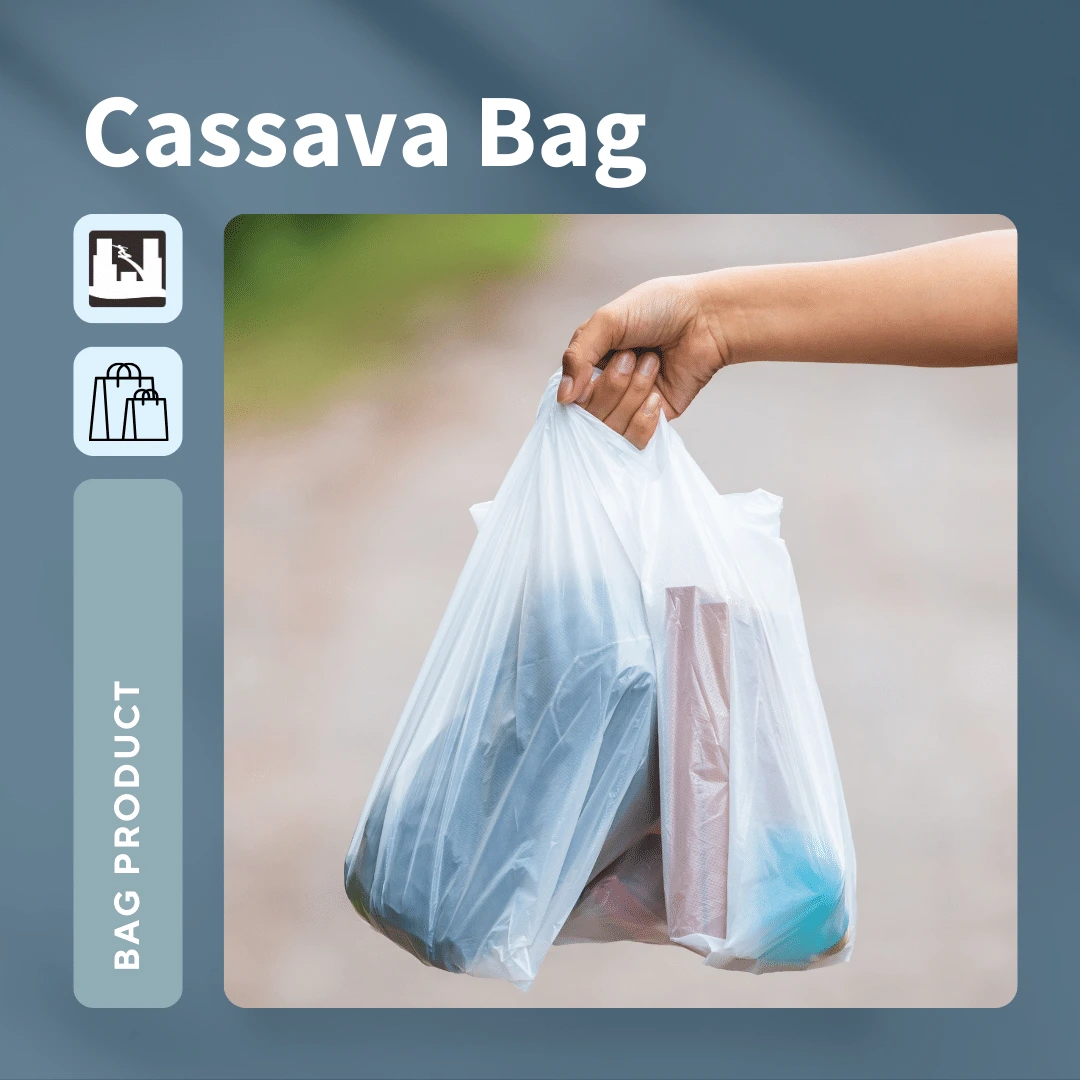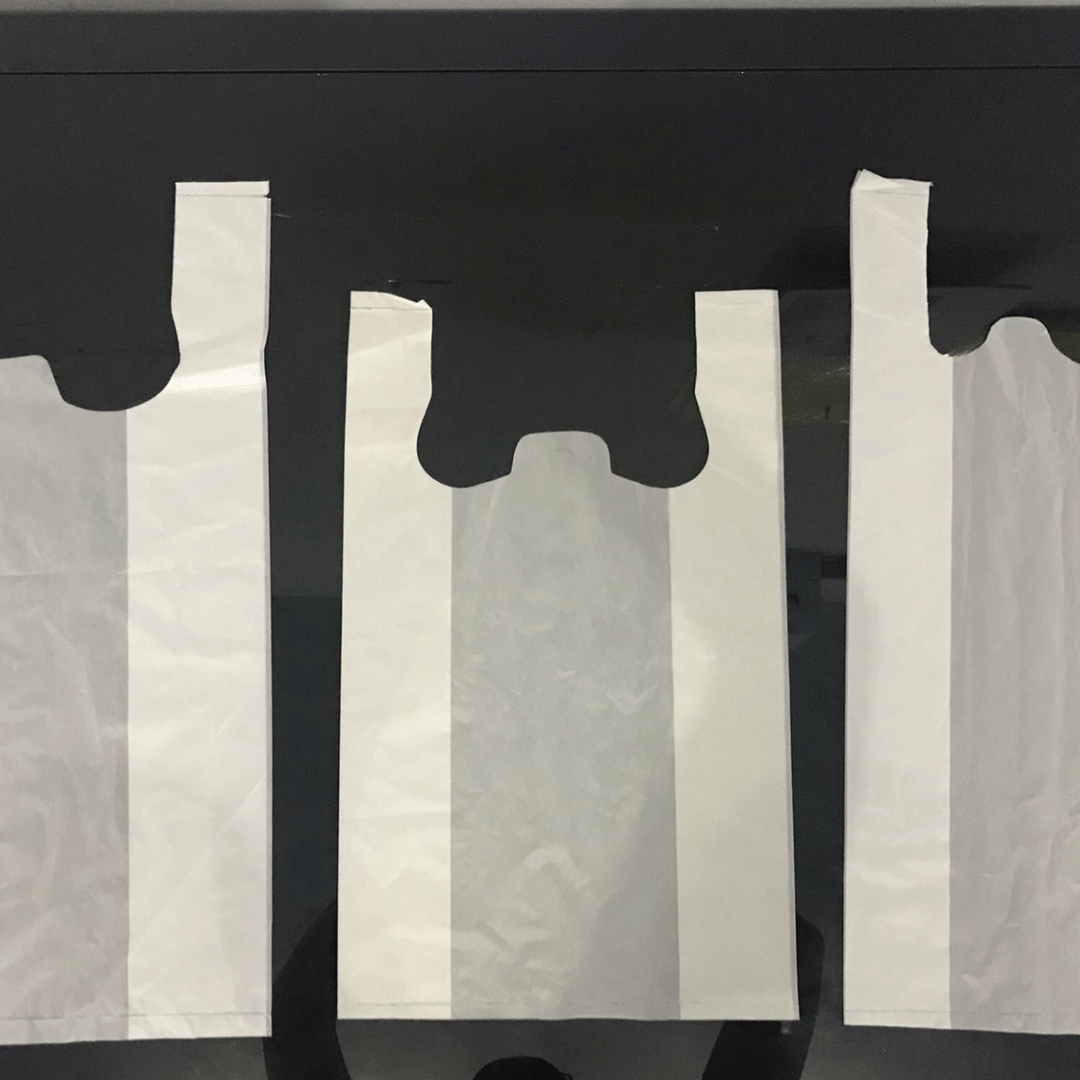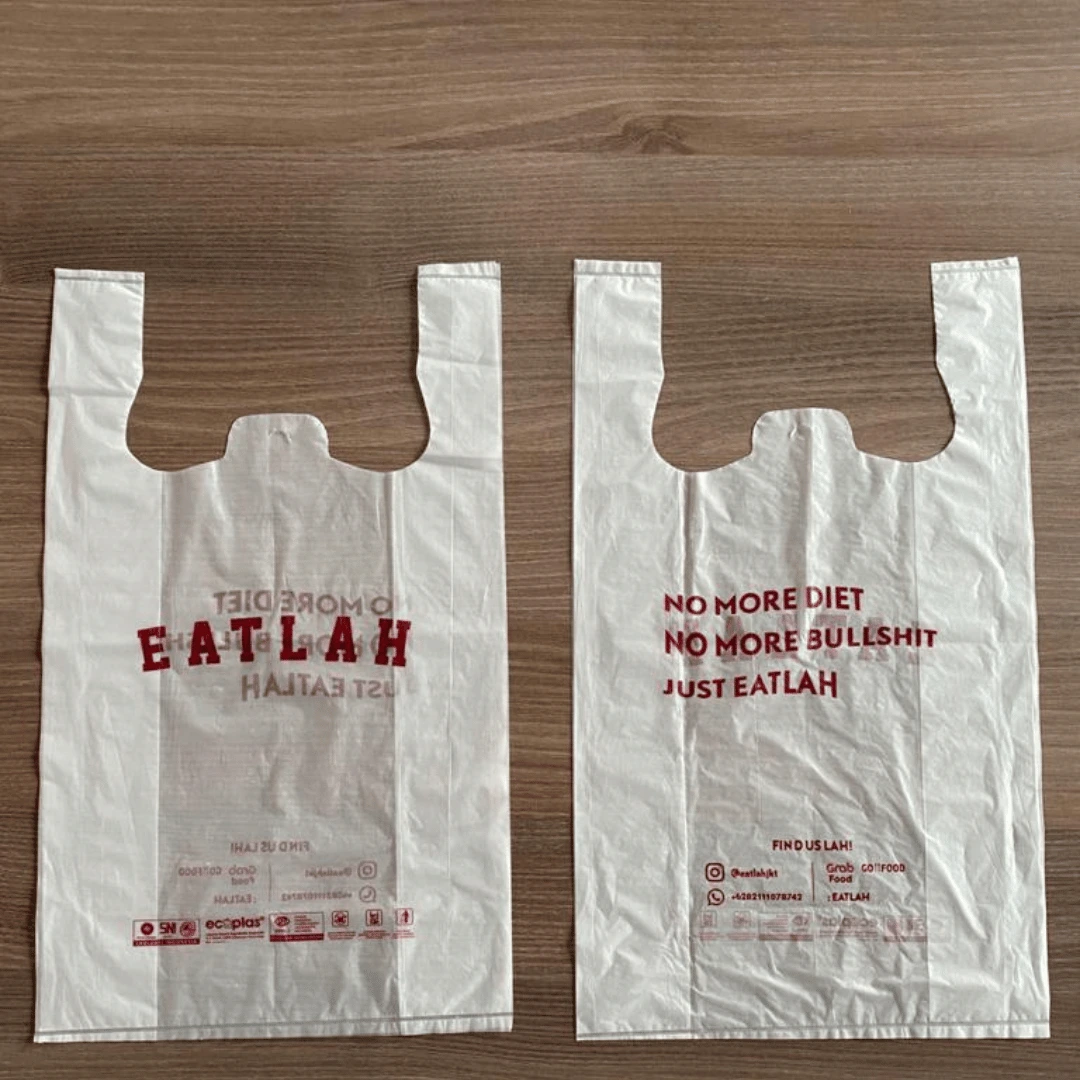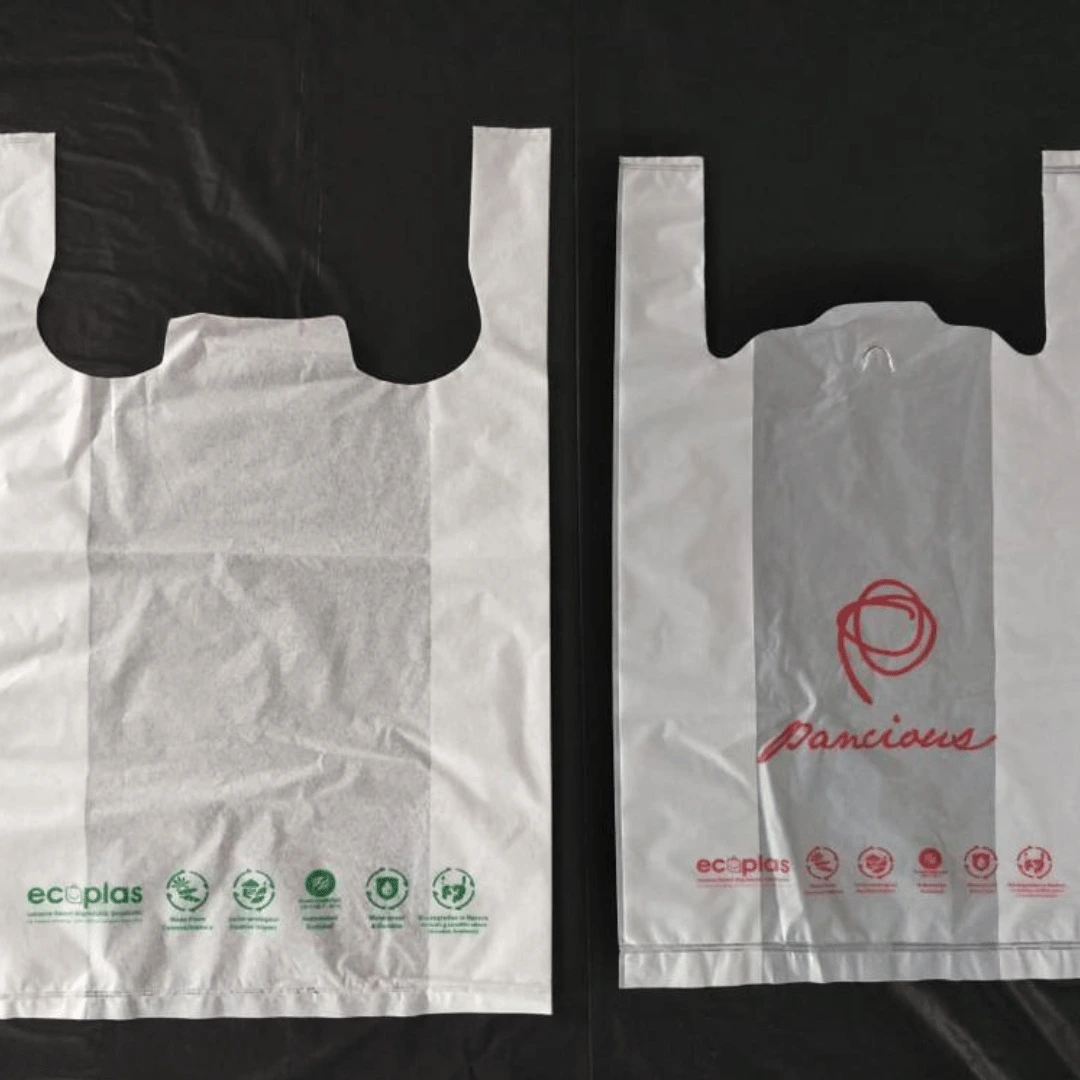Cassava Bag
Urban Product Details :
In order to better support the greening of the earth, Urban Plastics, as an Indonesian Plastic Manufacturer and Exporter, we produce biodegradable bags made from cassava, which is a cheap and common root vegetable from all over Indonesia. The main material of our cassava bags is Ecoplas Resin, which is also produced by Indonesian Plastic Manufacturers and Exporters, which is made from grafted cassava starch which is integrated with polyethylene polymer to form a new bioplastic molecular structure that is easily biodegradable and is no longer plastic. Therefore, if these bags are buried, they will decompose quickly within six months.
Our cassava bags can be made into:
T Shirt Bag, Soft Loop Bag, Die Cut Bag, Garbage Bag, Straws, Mailer Bag
We produce to 2 type of cassava bag:
- Urban WS (Water Soluble) : needs no industrial composting facility, since it can be degraded with the help of macro and micro organism in compost condition
- Urban WR (Water Resistant) : kind cassava bag that water resistant, biodegradable and compostable
Urban WS (Water Soluble)
This cassava plastic product is an environmentally friendly breakthrough, made from industrial starch and oil-derived vegetables, free of PE, PP, PS, or PET materials. Its main advantage lies in its biodegradability, allowing it to be transformed into compost after use, thus positively contributing to the environment. Additionally, this product can be recycled along with paper waste, reaffirming its commitment to recycling principles and waste reduction.
Safety is a priority in this product, which is harmless to animals and plants. It does not contribute to the formation of microplastics, making it a responsible choice for the environment. With its excellent antistatic properties, this product keeps its contents clean and dust-free. Moreover, its high oxygen barrier makes it ideal for dry food packaging, preserving freshness and extending the shelf life of food.
With a storage life of up to 2 to 3 years, cassava plastic offers an efficient and practical storage solution for various needs. Not only is it environmentally friendly, but it’s also effective and safe for daily use, making it an ideal choice for those seeking a sustainable and responsible plastic alternative.
Urban WR (Water Resistant)
The Water Resistant cassava plastic product is an eco-friendly innovation, made from industrial starch and oil-derived vegetables. It stands out for not containing materials like PE, PP, PS, or PET, making it a safer choice for the environment. One of its prime features is its biodegradability, allowing transformation into compost, positively contributing to soil health and the environment.
A key advantage of this cassava plastic is its water resistance. It has obtained the DIN CERTCO certification, ensuring its quality and reliability in resisting moisture and water. This makes it an ideal choice for packaging dry and fatty foods, such as snacks, nuts, or other fatty products, as it keeps the food dry and maintains its quality.
Regarding storage life, the Water Resistant cassava plastic boasts an impressive duration of 6 to 12 months. Post this period, it behaves like paper, supporting recycling and composting processes. This means the product offers short-term benefits during its use and long-term waste management solutions, making it a responsible, sustainable choice for consumers and producers concerned about the environment.
CASSAVA BAG
Technical Data Sheet
How to Process Cassava Waste into a Biodegradable Plastic
Plastic waste is one of the big problems for the earth. To reduce the impact of plastic waste, it is necessary to have a substitute for conventional plastic, namely biodegradable plastic. This material is widely available around us, it comes from a plant that contain a lot of starch, cellulose, protein, chitosan, and hemicellulose. It is easily decomposed by microorganisms, or it can decompose by itself. There is a lot of waste that can be used as biodegradable plastic, such as banana peels, cassava peels, wheat husk, corn, and other wastes that still contain starch. Indonesia Cassava Bag Manufacturer and Exporter provides solutions to convert cassava peels into environmentally friendly biodegradable plastic bag.
Of course, you must be curious how cassava peel waste can be processed into degradable plastic. Previously, we will explain what degradable plastic is. Environmentally friendly plastic is plastic that can be decomposed by the activity of decomposing microorganisms. Eco-friendly plastic have the same uses as synthetic plastic or conventional plastic. Usually this type of plastic is called biodegradable plastic. Indonesia Cassava Bag Manufacturer and Exporter is producing biodegradable plastic with cassava waste from plantation. In addition, the product is processed with other best materials to produce the best quality degradable plastic. Currently, biodegradable plastic is more popular than conventional plastics due to the increasing awareness of humans towards the environment.
Biodegradable plastic from Indonesia Cassava Bag Manufacturer and Exporter has the same strength and flexibility as conventional plastic. But, the process of making biodegradable plastic is longer than conventional plastic. It begins with processing cassava into cassava starch. Making cassava starch begins with soaking cassava tubers for a day and then it grated. To get the maximum quality of cassava starch, distilled water was added, squeezed and filtered. The obtained starch liquid is precipitated for 24 hours. Then the water from the sediment is removed to obtain wet starch, then the starch is dried in the oven. Cassava starch then is mixed with plasticizer.
Plasticizer is an additive that increase the flexibility and resilience of a plastic material, so that it will produce a strong plastic component. In this stage, Indonesia Cassava Bag Manufacturer and Exporter uses glycerol as a plasticizer. Then cassava flour is mixed with glycerol and the extrusion process is carried out using an extruder at a temperature of 100-160°C. The results of the extrusion will produce plastic pellets. It will be the raw material for making plastic. Next, the pellet will be put into a machine called a pelletizing machine. Pelletizing machine is a machine to accommodate pellets to be processed into vegetable bag.
Then the vegetable bag go through a heating and an inflatable process which eventually becomes plastic sheets. In the final process, molding is carried out, where this process will produce plastic as needed. Indonesia Cassava Bag Manufacturer and Exporter produce cassava bag with various size. Our product is not only environmentally friendly but also has a high quality. The difference between both plastics is that biodegradable plastics have a shorter lifespan due to its ability to decompose. Usually on biodegradable plastic, there will be a decomposition picture and an explanation of how long the plastic can be used until it finally decomposes. Biodegradable plastic is also proven to be safer as food and beverage packaging.
What is cassava plastic bags?
Cassava plastic bags are an eco-friendly alternative to traditional plastic bags, made from cassava starch, a natural, renewable resource. These bags are biodegradable and compostable, breaking down harmlessly in a short period, unlike conventional plastics that persist in the environment. Cassava bags offer a similar level of functionality and durability as regular plastic bags but with a significantly reduced environmental impact. They are a promising solution in the fight against plastic pollution, especially in regions where cassava is abundant. These innovative bags represent a step towards sustainable packaging and a greener future.
How long does cassava plastic last?
Cassava plastic, known for its biodegradable properties, decomposes significantly faster than conventional plastics. Under ideal composting conditions, cassava plastic can break down within months, a stark contrast to traditional plastics which can take hundreds of years. The exact decomposition time varies based on environmental factors like temperature, humidity, and microbial activity. In aquatic environments, these bags dissolve even quicker, reducing risks to marine life. This rapid degradation makes cassava plastic a sustainable alternative, aligning with environmental goals and reducing long-term waste accumulation.
Do cassava bags dissolve in water?
Cassava bags are designed to dissolve in water, making them a unique and environmentally friendly alternative to traditional plastic bags. When exposed to water, especially at high temperatures, these bags start to break down, eventually dissolving completely. This characteristic is particularly beneficial in reducing plastic pollution in aquatic environments, as it minimizes harm to marine life. However, their water-soluble nature means they are not suitable for storing liquids or use in wet conditions. Despite this, their biodegradable properties make them an excellent choice for eco-conscious consumers and applications where rapid decomposition is desired.
What are the advantages of cassava bags?
Cassava bags offer several environmental and practical advantages. They are biodegradable and compostable, breaking down quickly and safely, reducing plastic pollution and landfill waste. Made from cassava starch, a renewable resource, they are a sustainable alternative to petroleum-based plastics. These bags are also non-toxic, posing no harm to wildlife or the environment upon disposal. Water-soluble and harmless when consumed, they mitigate risks to marine and terrestrial animals. Cassava bags maintain a similar strength and functionality as conventional plastic bags, providing a viable, eco-friendly option for consumers and businesses.
Are cassava bags sustainable?
Cassava bags are considered sustainable due to their eco-friendly properties. They are made from cassava starch, a renewable and abundantly available resource, especially in tropical regions. Unlike traditional plastic bags, which are derived from non-renewable petroleum, cassava bags offer a more sustainable lifecycle. They are biodegradable and compostable, breaking down into natural compounds without leaving harmful residues, thereby reducing environmental pollution. Their production and disposal have a lower ecological footprint, aligning with principles of sustainability and offering a greener alternative to conventional plastic bags.
Are cassava bags edible?
Cassava bags, made from cassava starch, are technically edible due to their natural, non-toxic composition. However, they are not intended for consumption and should not be considered a food source. Their primary purpose is as an eco-friendly alternative to traditional plastic bags, offering biodegradability and compostability. While their edibility is a safety feature, reducing harm if accidentally ingested by animals or marine life, it’s important to note that their nutritional value is negligible and they’re not produced under food-grade conditions.
Why is cassava used in bioplastic?
Cassava is used in bioplastic production due to its favorable properties and sustainability. It’s a renewable resource, abundantly available in many tropical regions, making it a cost-effective raw material. Cassava starch is easily converted into bioplastics, offering a viable alternative to petroleum-based plastics. These bioplastics are biodegradable and compostable, reducing environmental impact and pollution. Additionally, cassava-based bioplastics are non-toxic and safe for wildlife and ecosystems. Their use supports a circular economy, aligning with global efforts to reduce reliance on fossil fuels and minimize ecological footprints.
Are cassava bags compostable?
Cassava bags are indeed compostable, a key attribute that makes them environmentally friendly. Made from cassava starch, a natural and renewable material, these bags break down into harmless organic compounds when composted. This decomposition process typically occurs within a few months under appropriate composting conditions, such as the presence of microorganisms, moisture, and oxygen. Unlike traditional plastic bags, cassava bags do not leave toxic residues or microplastics behind. Their compostability aligns with sustainable waste management practices, reducing landfill waste and contributing positively to the environmental cycle.
What is the process of manufacturing plastic bags?
The manufacturing of plastic bags typically involves the following steps: First, raw materials, usually polyethylene, are melted in an extruder. This molten plastic is then blown into a thin film through a circular die in a process known as blow film extrusion. The film is cooled and flattened into a lay-flat tube. This tube is then either sealed and cut into lengths to form bottom-seal bags or cut open to create flat bags. The bags are then printed, if required, and packed for distribution. This process allows for the mass production of lightweight, durable plastic bags in various sizes and thicknesses.






